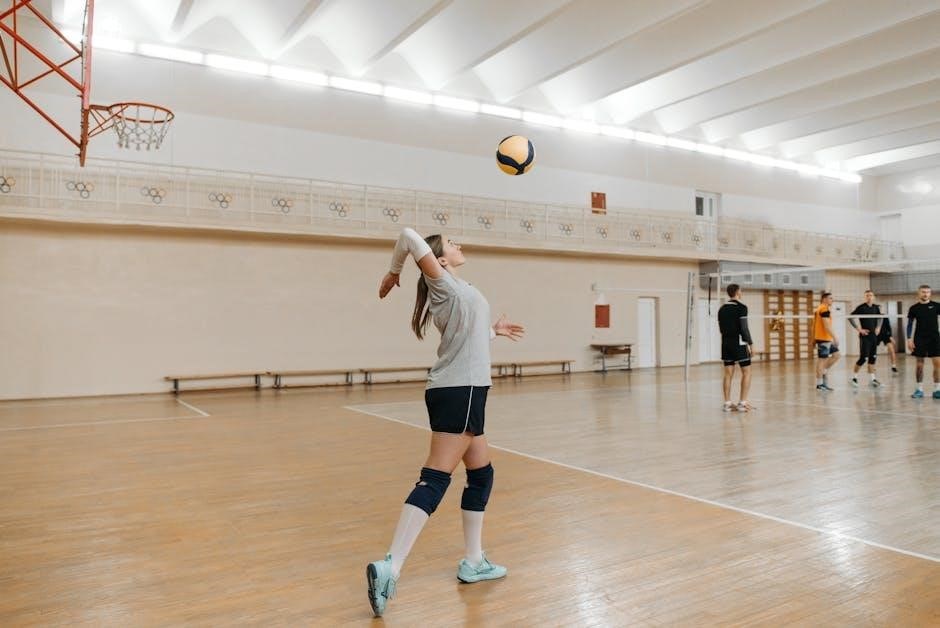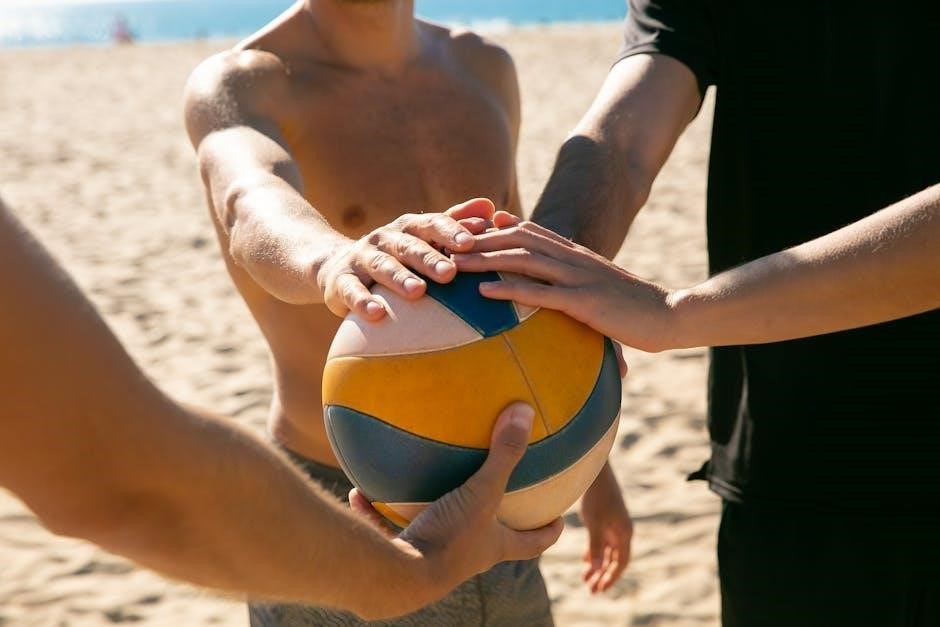The 2023 NFHS Volleyball Rules provide a comprehensive guide for high school volleyball‚ ensuring safety‚ sportsmanship‚ and fair play. These rules‚ overseen by the National Federation of State High School Associations‚ outline gameplay standards‚ player eligibility‚ and coach responsibilities‚ while also introducing updates to enhance the sport’s integrity and enjoyment for all participants.
Overview of the NFHS Volleyball Rules
The NFHS Volleyball Rules 2023 PDF offers a structured framework for high school volleyball‚ detailing essential regulations for gameplay‚ player conduct‚ and safety protocols. The document outlines the game’s fundamental rules‚ including team composition‚ match duration‚ and scoring systems. It also addresses equipment standards‚ facility requirements‚ and official responsibilities. Key updates for the 2023 season focus on enhancing player safety‚ clarifying coaching protocols‚ and maintaining consistent enforcement of regulations to ensure a fair and enjoyable sporting experience for all participants.
Importance of Understanding the Rules
Understanding the NFHS Volleyball Rules 2023 is crucial for maintaining fair play‚ safety‚ and sportsmanship. Coaches‚ players‚ and officials must adhere to these guidelines to ensure smooth gameplay and consistent enforcement. Proper knowledge prevents misunderstandings‚ reduces conflicts‚ and promotes a positive environment. By familiarizing themselves with the rules‚ participants can focus on improving skills and enjoying the game‚ fostering a competitive yet respectful atmosphere for all involved in high school volleyball.

Structure of the 2023 NFHS Volleyball Rules Document
The document is organized into clear sections‚ covering foundational rules‚ gameplay specifics‚ and updates for 2023. It includes key points of emphasis and rule changes for easy reference.
Organization of the Rules Manual
The 2023 NFHS Volleyball Rules Manual is structured logically‚ with clear sections and subsections for easy navigation. It begins with foundational rules‚ followed by specific gameplay guidelines‚ and concludes with updates for the 2023 season. Points of emphasis and rule changes are highlighted to ensure clarity. The manual also includes editorial changes and interpretations to aid understanding. Resources such as the official PDF and guides for coaches and officials are available for further reference‚ ensuring comprehensive access to all necessary information.
Key Sections and Subsections
The 2023 NFHS Volleyball Rules Manual includes essential sections such as gameplay rules‚ player eligibility‚ and equipment standards. Subsections detail specific guidelines for scoring‚ fouls‚ and penalties. Additionally‚ it covers coaching protocols‚ sportsmanship expectations‚ and safety measures. The document also outlines rule changes for the 2023 season‚ ensuring clarity on new regulations. Key areas like uniforms‚ timeouts‚ and substitutions are thoroughly addressed‚ providing a complete reference for players‚ coaches‚ and officials to ensure a fair and enjoyable competition.

Key Personnel in NFHS Volleyball Matches
The referee‚ scorekeeper‚ and coaches play crucial roles in ensuring fair and organized gameplay. Their responsibilities include enforcing rules‚ tracking scores‚ and guiding players effectively during matches;
Role of the Referee
The referee is the primary authority during a match‚ responsible for enforcing NFHS volleyball rules. They ensure fair play‚ make critical decisions‚ and maintain control over the game’s flow. The referee monitors player conduct‚ manages timeouts‚ and handles disputes. Their decisions are final‚ and they work closely with other officials to uphold the integrity of the game. Proper communication and impartiality are essential for effective refereeing‚ ensuring a smooth and fair competition for all participants.
Duties of the Scorekeeper
The scorekeeper plays a crucial role in managing the game’s administrative aspects. They accurately record scores‚ track substitutions‚ and monitor timeouts‚ ensuring all actions comply with NFHS rules. The scorekeeper maintains detailed statistics and communicates with officials to confirm scores. Their precise documentation ensures smooth gameplay and fair outcomes‚ making them an essential part of the match’s organization and integrity.
Responsibilities of Coaches
Coaches are responsible for ensuring their team complies with NFHS rules‚ promoting sportsmanship‚ and maintaining a positive environment. They must verify player eligibility‚ manage substitutions‚ and communicate effectively with officials. Coaches are also expected to instruct players during dead balls and adhere to coaching zone protocols. Additionally‚ they must avoid unsportsmanlike conduct‚ such as attempting to influence referees’ decisions‚ and ensure their team’s uniforms meet NFHS standards. Their role is crucial in fostering fair play and respect for the game.

Player Eligibility and Requirements
Players must meet age and academic eligibility criteria‚ wear approved uniforms‚ and adhere to safety protocols. These requirements ensure fair competition and player well-being.
Age and Academic Eligibility
Players must meet specific age and academic requirements to participate in NFHS-sanctioned volleyball matches. The rules stipulate that athletes must not exceed a maximum age limit and maintain passing grades. Academic eligibility ensures students prioritize education alongside athletics. Schools are responsible for verifying eligibility through official documentation. These criteria aim to promote fair competition and ensure student-athletes balance their athletic and academic responsibilities effectively. Compliance with these rules is mandatory for participation.
Uniform and Equipment Standards
The NFHS mandates specific uniform and equipment standards for volleyball players. Uniforms must meet contrasting color requirements to avoid confusion during play. Jewelry is prohibited for safety reasons‚ and officials inspect uniforms before matches. Equipment‚ including nets‚ balls‚ and footwear‚ must adhere to safety and size specifications. These rules ensure fairness‚ safety‚ and consistency across all competitions‚ maintaining the integrity of the game while protecting player well-being and promoting a professional appearance.
Player Safety Protocols
The NFHS emphasizes player safety through strict protocols. These include mandatory pre-game inspections of equipment and facilities‚ concussion management plans‚ and rules to prevent injury from illegal plays. Players are prohibited from wearing unsafe items like jewelry‚ and officials enforce rules to minimize collisions. Safety guidelines also address emergency response plans‚ ensuring prompt medical attention when needed. These measures prioritize player well-being‚ reducing risks and fostering a secure environment for competition.

Gameplay Rules and Regulations
The 2023 NFHS Volleyball Rules define legal play‚ including ball handling‚ scoring‚ and court boundaries. They ensure fair competition‚ clarify penalties‚ and standardize gameplay procedures.
Match Format and Duration
A volleyball match is played best 2 out of 3 sets‚ with each set played to 25 points and a minimum lead of 2 points. The third set‚ if needed‚ is played to 15 points with the same 2-point advantage rule. Teams must start with 6 players and maintain at least 6 players throughout the match. The duration varies based on skill level and competition‚ but standard high school matches typically last 60-90 minutes. Officials enforce strict timing rules for serves‚ timeouts‚ and substitutions to maintain efficient gameplay and fair competition.
Scoring System and Win Conditions
Volleyball matches use rally scoring‚ where a point is awarded to the opposing team if the serving team fails to return the ball or makes a mistake. A match is won by the first team to win 2 out of 3 sets. Each set is played to 25 points with a 2-point advantage‚ while a deciding third set is played to 15 points with the same 2-point rule. The total match duration typically ranges from 60 to 90 minutes‚ ensuring efficient and competitive gameplay.
Ball in Play and Out of Bounds Rules
The ball is considered in play until the referee blows their whistle‚ signaling a stoppage. It is out of bounds if it lands outside the court or touches a non-player. A touch is legal if made within the court‚ but the ball must be completely over the boundary to be ruled out. Teams are penalized for touching the ball illegally‚ and play resumes with a serve or side-out‚ ensuring fair and consistent gameplay adherence to NFHS regulations.

Violations and Penalties
Violations include unsportsmanlike conduct‚ illegal moves‚ and miscommunication. Penalties‚ such as loss of point or disqualification‚ ensure fair play and adherence to NFHS standards.
Common Fouls and Their Consequences
Common fouls in NFHS volleyball include lifting‚ carrying‚ or double contact‚ resulting in a loss of point or side-out. Illegal screens‚ improper alignments‚ and unsportsmanlike conduct also incur penalties. Officials signal these fouls‚ and consequences range from loss of serve to player disqualifications. Understanding these rules ensures fair play and maintains the integrity of the game‚ promoting sportsmanship and accountability among players and coaches.
Unsportsmanlike Conduct and Penalties
Unsportsmanlike conduct‚ such as taunting‚ profanity‚ or excessive celebrations‚ is penalized under NFHS rules. Players or coaches engaging in such behavior may face warnings‚ yellow or red cards‚ or disqualifications. Repeated offenses can lead to ejections and further disciplinary action. These penalties aim to uphold respect and sportsmanship‚ ensuring a positive environment for all participants and spectators‚ while maintaining the game’s integrity and promoting fair play at all levels of competition.
Procedures for Protesting Decisions
Protests regarding referee decisions must be submitted in writing to the state association within a specified timeframe. NFHS rules mandate that protests are only considered for rule misapplications‚ not judgment calls. Teams must provide evidence and follow established protocols. Failure to comply may result in dismissal of the protest. Officials’ decisions are final unless overturned by the governing body. Unsportsmanlike conduct during protests may lead to penalties‚ emphasizing the importance of respectful and procedural compliance in resolving disputes fairly and efficiently.
Coaching Protocols and Restrictions
The 2023 NFHS volleyball rules expand the coaching zone but restrict coaches from influencing referees’ decisions‚ emphasizing fair play and maintaining consistency with current sports standards.
Coaching Zone and Movement
The 2023 NFHS volleyball rules clarify the coaching zone‚ allowing coaches to move beyond the end line but restricting them to their team’s bench area during play. Only one assistant coach may stand at a time to instruct players‚ emphasizing organized communication. Coaches must avoid unsportsmanlike conduct‚ such as attempting to influence referees’ decisions. These protocols ensure fair play and maintain professionalism‚ aligning with the overall goal of promoting a respectful and competitive environment.
Timeouts and Substitutions
Teams are allowed a maximum of two timeouts per set‚ each lasting 30 seconds. Substitutions must be direct and completed before the next serve. Coaches can request timeouts to strategize‚ but unauthorized substitutions result in penalties. The scorekeeper must be notified of all substitutions to ensure compliance with the rules. These regulations streamline gameplay and ensure fair participation‚ aligning with the NFHS’s commitment to maintaining competitive balance and sportsmanship in high school volleyball.
Communication with Players and Officials
Coaches must communicate with players and officials respectfully and professionally. Coaches are restricted to the designated coaching zone during matches. Only one coach may stand at a time to instruct players. Unauthorized communication with players during timeouts or between sets is prohibited. Officials must enforce rules to prevent unsportsmanlike conduct‚ such as coaches attempting to influence referees’ decisions. Clear and respectful dialogue ensures fair play and maintains the integrity of the game‚ as outlined in the 2023 NFHS Volleyball Rules.

Sportsmanship and Conduct
Sportsmanship is a cornerstone of NFHS Volleyball Rules. Players‚ coaches‚ and spectators must exhibit respect and integrity. Unsporting behavior‚ including taunting or excessive celebrations‚ may result in penalties.
Expected Behavior for Players and Coaches
Players and coaches must maintain respect and integrity during competitions. They are expected to adhere to NFHS rules‚ avoiding unsportsmanlike conduct such as taunting or excessive celebrations. Coaches should model positive behavior‚ instructing players professionally and avoiding actions that influence referees. Communication must remain respectful toward officials‚ opponents‚ and teammates. Both players and coaches are accountable for promoting a positive‚ fair-play environment‚ ensuring the game reflects the values of sportsmanship and mutual respect.
Rules for Spectator Conduct
Spectators must adhere to NFHS guidelines‚ maintaining respectful and courteous behavior. They should avoid interfering with gameplay or officials’ decisions. Cheering should be positive and supportive‚ refraining from unsportsmanlike or disruptive actions. Spectators are expected to follow venue rules and promote a positive environment for all participants. Failure to comply may result in removal from the premises‚ ensuring fair play and sportsmanship are upheld throughout the match.
Consequences for Misconduct
Misconduct by players‚ coaches‚ or spectators may result in penalties‚ including warnings‚ ejections‚ or forfeits. Repeated or severe violations can lead to further disciplinary action‚ such as suspensions or bans. Officials enforce these consequences to maintain fair play and sportsmanship‚ ensuring a respectful environment for all participants. The NFHS rules emphasize accountability and uphold the integrity of the game through these measures.

Equipment and Facility Standards
Officials enforce NFHS rules‚ ensuring proper uniform compliance and equipment safety. Teams must meet uniform standards‚ with penalties for non-compliance‚ maintaining fair play and consistency.
Net and Court Dimensions
The NFHS Volleyball Rules specify that the court must measure 18 meters by 9 meters‚ with a center line dividing it into two equal halves. The net height is 2.43 meters for girls’ volleyball and 2.53 meters for boys’. These dimensions ensure consistent and fair gameplay‚ adhering to safety standards and promoting competitive balance across all matches. Proper measurement and setup are essential for maintaining the integrity of the game.
Ball Specifications
The NFHS Volleyball Rules 2023 specify that the ball must be spherical‚ with a circumference of 65-67 cm for girls and 63-65 cm for boys. It should weigh between 260-280 grams and be made of leather or synthetic material. The ball must maintain its shape when inflated to 0.3-0.325 kg/cm² pressure. Panels and seams must be evenly spaced and securely stitched or glued to prevent water absorption. These standards ensure consistency and fair play in all matches.
Safety Requirements for Facilities
Facilities must meet specific safety standards to ensure player well-being. Courts should have proper lighting‚ non-slip flooring‚ and emergency exits.Padding for posts and walls is mandatory to prevent injuries. First aid kits and automated external defibrillators (AEDs) must be readily available. The playing area should be free from obstacles‚ with a minimum clearance of 7 meters vertically and 2 meters horizontally around the court. Proper ventilation and temperature control are also essential for player comfort and safety during matches.

Rule Changes for the 2023 Season
The 2023 NFHS Volleyball Rules introduced updates to coaching protocols‚ player equipment‚ and safety protocols‚ aligning with current trends to enhance gameplay and ensure athlete well-being.
The 2023 NFHS Volleyball Rules introduced several key changes‚ including expanded coaching zones‚ updated uniform requirements‚ and stricter penalties for unsportsmanlike conduct. Additionally‚ rules regarding player equipment and safety protocols were refined to align with current standards‚ ensuring a safer and more consistent competitive environment. These amendments aim to enhance gameplay fairness‚ player safety‚ and overall sportsmanship across high school volleyball competitions nationwide.
Rationale Behind the Changes
The 2023 NFHS Volleyball Rules changes aim to align with current trends in sports governance‚ enhance player safety‚ and improve game flow. Adjustments to coaching protocols and uniform standards ensure consistency and fairness. These updates reflect feedback from coaches‚ officials‚ and players‚ addressing areas where clarification or modernization was needed. The changes also emphasize sportsmanship and maintain the integrity of the game‚ ensuring it evolves while staying true to its core values.
Impact on Gameplay and Strategy
The 2023 NFHS Volleyball Rules changes influence gameplay by refining strategies and ensuring fair competition. Expanded coaching zones allow for better communication‚ while uniform consistency enhances focus on performance. Penalties for insufficient players encourage teams to maintain full rosters‚ promoting preparedness. These adjustments encourage tactical adaptations‚ fostering a balanced and dynamic competitive environment for players and coaches alike.
The 2023 NFHS Volleyball Rules emphasize fair play and safety. Adherence ensures integrity and sportsmanship‚ shaping the future of high school volleyball.
Importance of Adhering to the Rules
Adhering to the NFHS Volleyball Rules ensures fair play‚ consistency‚ and safety for all participants. Rules promote sportsmanship‚ respect‚ and integrity‚ fostering a positive environment for competition. Proper enforcement prevents confusion and disputes‚ while penalties for violations maintain accountability. Following guidelines protects player well-being and upholds the game’s integrity. Compliance also ensures equitable conditions for all teams‚ allowing the sport to thrive and grow. Rules are foundational to the enjoyment and development of volleyball at all levels.
Future of NFHS Volleyball Rules
The future of NFHS Volleyball Rules focuses on enhancing safety‚ fairness‚ and player engagement. The NFHS continuously adapts rules to align with evolving trends and technological advancements. Emphasizing sportsmanship and player well-being‚ future updates aim to promote inclusivity and accessibility. By balancing tradition with innovation‚ the NFHS ensures volleyball remains a dynamic and enjoyable sport for generations. Ongoing collaboration with coaches‚ officials‚ and players will shape the sport’s growth and maintain its integrity.

Additional Resources
Access the official 2023 NFHS Volleyball Rules PDF on the NFHS website for detailed guidelines. Additional resources include coaching guides‚ rule interpretation articles‚ and training materials to support officials and players.
Where to Find the Official 2023 NFHS Volleyball Rules PDF
The official 2023 NFHS Volleyball Rules PDF is available on the NFHS website. This comprehensive document outlines all rules‚ updates‚ and interpretations for the season. Coaches‚ officials‚ and players can download it directly from the NFHS portal‚ ensuring access to the most accurate and authoritative guidelines. Additional resources‚ such as rule interpretation articles and training materials‚ are also accessible on the NFHS platform to support understanding and implementation of the rules.
Guides and Interpretations for Coaches and Officials
Coaches and officials can access detailed guides and interpretations of the 2023 NFHS Volleyball Rules through the NFHS website. These resources include rule interpretation articles‚ training webinars‚ and case books to clarify complex scenarios. Officials and coaches can also refer to the annual Rules PowerPoint and Points of Emphasis documents for insights into rule changes and application. These tools ensure consistent understanding and enforcement of the rules during matches and practices.
